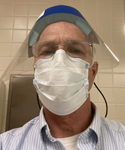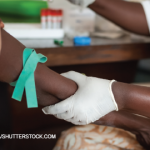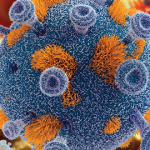 A young man sits down at my COVID-19 immunization station at Maine Medical Center and stares resolutely ahead, focusing on the far wall. He looks nervous. I make sure the needle and syringe are outside his field of vision. That should help. I pick up a Band-Aid from my box of supplies. It’s a Band-Aid large enough to cover a shark wound, and I wave it in front of his nose. “This is what we’ll use after the shot. You need to keep it on for one year.” He cracks a smile. I deliver the shot. A moment later he gives me the thumbs up sign and literally skips down the hallway.
A young man sits down at my COVID-19 immunization station at Maine Medical Center and stares resolutely ahead, focusing on the far wall. He looks nervous. I make sure the needle and syringe are outside his field of vision. That should help. I pick up a Band-Aid from my box of supplies. It’s a Band-Aid large enough to cover a shark wound, and I wave it in front of his nose. “This is what we’ll use after the shot. You need to keep it on for one year.” He cracks a smile. I deliver the shot. A moment later he gives me the thumbs up sign and literally skips down the hallway.
I am a volunteer COVID-19 vaccinator, overjoyed that after more than 335,000 deaths in the U.S. and 1.7 million deaths worldwide, two vaccines, one from Pfizer, the other from Moderna Pharmaceuticals, have been approved by the FDA to prevent COVID-19. Legitimate questions remain regarding the safety and effectiveness of the vaccines, but let’s put these important issues into perspective and celebrate a remarkable achievement: After only 11 months since the first patient was sickened with COVID-19 in the U.S., there is hope that the worst of the pandemic will soon recede.
Rapid Development
How unusual is it to have a vaccine developed and approved by the FDA in less than a year?
In the case of HIV, in 1985, when I was a visiting internal medicine resident rotating through the department of Rheumatology and Clinical Immunology at Yale Medical Center, HIV-1 was universally fatal. Decades later, we have effective medications for suppressing the virus, but to date, no vaccine has been approved for general use—although several vaccines are in clinical trials.1
We can also consider malaria. In 2019, 409,000 deaths due to malaria occurred worldwide, and two-thirds of those were of children under the age of 6.2 A trial completed in 2019 demonstrated that a new vaccine, Mosquirix, prevented approximately four in 10 predicted cases.3 This vaccine is a welcome beginning, but it’s relatively ineffective compared with traditional vaccination against polio or measles or rubella.
Why has science struggled to develop vaccinations to prevent HIV-1 or malaria? There is no simple answer. There may be some truth to the assertion that because malaria and HIV often infect the poor or those at the margins of society that vaccine funding has been insufficient. But this view dismisses the work of countless, talented scientists who spent their entire careers in vaccine research and failed to unravel the mystery of HIV-1 or malaria.
With recent advances in technology, the genetic blueprint of the Coronavirus was determined in record time, and novel strategies developed to produce new vaccines.
Safety
And what of risk? Are the vaccines safe? Most of us accept risk within reason. Each day, we make an effort to avoid unacceptable risk. We move indoors when a thunderstorm races across the sky. We check our clothes for ticks after a hike. If we have elevated blood pressure, we consider medications to lower the risk of stroke or heart attack. Even with the risk of side effects, the majority of us choose treatment over avoidance, action over inaction.
In the studies leading up to approval by the FDA, the Pfizer and Moderna vaccine safety records were good, not perfect. Minor side effects—local discomfort, muscle aching and low-grade fevers—were relatively common. By Christmas Eve, after more than a million Americans were immunized against COVID-19, reports of serious side effects have been extremely rare.
Looking Ahead
I think briefly about the challenges of malaria and HIV and the risk vs. benefits of vaccination as I draw up my next dose of vaccine. An older nurse sits down and rolls up her sleeve. A look of contentment spreads across her face. “It’s been 8 months since I’ve been able to see my mother,” she tells me. “She’s 94 and lives alone, and I’ve been terrified that I could be the person who infects her with the virus. I believe the vaccine will let us get back to the business of hugging. My mother needs that; I know I do.”
The line is long, but it’s moving along. 2021 will be a better year. It won’t be long before we can hug again.
 Charles Radis, DO, is clinical professor of medicine at the University of New England, College of Osteopathic Medicine and employed part time at Maine Coast Memorial Hospital in Ellsworth, Maine. Contact him via e-mail [email protected] or on his website.
Charles Radis, DO, is clinical professor of medicine at the University of New England, College of Osteopathic Medicine and employed part time at Maine Coast Memorial Hospital in Ellsworth, Maine. Contact him via e-mail [email protected] or on his website.
References
- Burton DR. Advancing an HIV vaccine; advancing vaccinology. Nat Rev Immunol. 2019 Feb;19(2):77–78.
- World malaria report 2019. Geneva: World Health Organization; 2019.
- Draper SJ, Sack BK, King CR, et al. Malaria vaccines: Recent advances and new horizons. Cell Host Microbe. 2018 Jul 11;24(1):43–56.
Reprinted from the personal blog of Charles Radis, DO, with permission (https://doctorchuckradis.com/2020/12/27/its-immunization-day/?preview=true).




